A Beginner’s Guide to know about Smart Contracts
One of the most unique features of blockchain is its quality of acting as a decentralized which is shared between all the parties of the network thus, eliminating the involvement of middlemen or third-party intermediaries. This feature is particularly useful because it saves you from the chances of any process conflict and saves time too. Though Blockchains have their own set of issues that are yet to be resolved, they offer faster, cheaper and more efficient options as compared to the traditional systems. Due to this, even the banks and governmental organizations are turning to blockchains these days.
Smart contracts can be termed as the most utilized application of blockchain technology in the current times. The concept of smart contracts was introduced by Nick Szabo, a legal scholar, and cryptographer in the year 1994. He came to a conclusion that any decentralized ledger can be used as self-executable contracts which, later on, were termed as Smart Contracts. These digital contracts could be converted into codes and allowed to be run on a blockchain.
Though the idea of smart contracts came into existence long back, the current world that we live in works on paper-based contracts. Even if digital contracts are used, the involvement of a trusted third-party from the system cannot be eliminated. While we have defined a system of functioning with this method; we cannot say for sure if it is always smooth. The involvement of third-party might lead to security issues or fraudulent activities along with an increased transactional fee.
With the introduction of blockchain in the digital technology space, such issues can be addressed efficiently. A blockchain based system allows all the entities in the network to interact with each other in a distributed manner thus, eliminating the requirement of any trusted third-party. In simple terms, Blockchain is a technology that stores data on a distributed ledger. The stored data of records and transactions are available to all the parties in the network in real-time. Blockchain technology gained attention with the introduction of the Bitcoin, the first and most established cryptocurrency so far. Other than the application of cryptocurrency, Blockchain has evolved and its use cases are coming forward in different industries.
Smart contracts are one of the most successful applications of the blockchain technology. Using smart contracts in place of traditional ones can reduce the transaction costs significantly. Ethereum is the most popular blockchain platform for creating smart contracts. It supports a feature called Turing-completeness that allows the creation of more customized smart contracts. Smart contracts can be applied in different industries and fields such as smart homes, e-commerce, real-estate and asset management etc.
What are Smart Contracts?
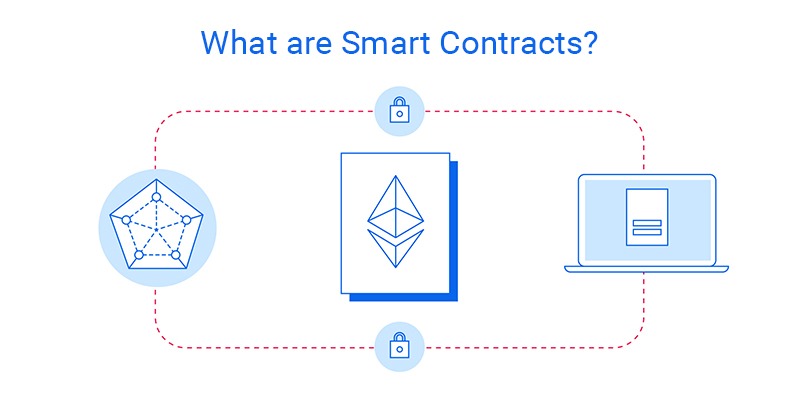 A smart contract is a set of computer code between two or more parties that run on the top of a blockchain and constitutes of a set of rules which are agreed upon by the involved parties. Upon execution, if these set of pre-defined rules are met, the smart contract executes itself to produce the output. This piece of code allows decentralized automation by facilitating, verifying, and enforcing the conditions of an underlying agreement. Smart contracts allow you to exchange anything of value including money, shares, property etc, in a transparent manner eliminating the need for a middleman and keeping the system conflict-free.
A smart contract is a set of computer code between two or more parties that run on the top of a blockchain and constitutes of a set of rules which are agreed upon by the involved parties. Upon execution, if these set of pre-defined rules are met, the smart contract executes itself to produce the output. This piece of code allows decentralized automation by facilitating, verifying, and enforcing the conditions of an underlying agreement. Smart contracts allow you to exchange anything of value including money, shares, property etc, in a transparent manner eliminating the need for a middleman and keeping the system conflict-free.
In a normal world process for getting a court-registered document as a proof, you would need to go to a lawyer or notary first, give them money in turn of their services and wait till you get the document that you need. However, the scenario changes completely with smart contracts. When you run this process with smart contracts, you’d simply get the document of your need by paying just for that and this will be done without the involvement of any third-party such as the lawyer in this case. Moreover, smart contracts are not limited to only defining the rules around any agreement but they are also responsible for automatically executing those rules and obligations.
In other words, Smart contracts are automatically executable lines of code that are stored on a blockchain which contain predetermined rules. When these rules are met, these code executes on its own and provides the output. In the simplest form, smart contracts are programs that run according to the format that they’ve been set up by their creator. Smart contracts are most beneficial in business collaborations in which they are used to agree upon the decided terms set up by the consent of both the parties. This reduces the risk of fraud and as there is no third-party involved, the costs are reduced too.
To summarise, smart contracts usually work on a mechanism that involves digital assets along with multiple parties where the involved participants can automatically govern their assets. These assets and be deposited and redistributed among the participants according to the rules of the contract. Smart contracts have the potential to track real-time performance and save costs.
Smart Contracts Properties:
- Self-verifiable
- Self-executable
- Tamper Proof
How does a Smart Contract Work?
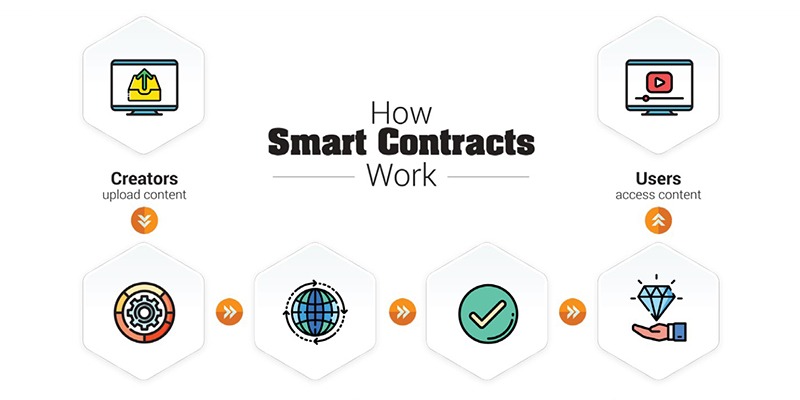 In order to understand how a smart contract works, let’s take an example where you wish to sell a property of your own. The process of selling properties demands a lot of paperwork as well as communication with multiple parties. Other than the communication complexity, it also involves the risk of frauds. In the current times, most of the people who want to deal in properties make their way ahead through real-estate agents. These agents are responsible for dealing with the paperwork and markets. They act as intermediaries in the overall process and work on negotiations and overseeing deal.
In order to understand how a smart contract works, let’s take an example where you wish to sell a property of your own. The process of selling properties demands a lot of paperwork as well as communication with multiple parties. Other than the communication complexity, it also involves the risk of frauds. In the current times, most of the people who want to deal in properties make their way ahead through real-estate agents. These agents are responsible for dealing with the paperwork and markets. They act as intermediaries in the overall process and work on negotiations and overseeing deal.
In such cases, you can’t rely on the person that you’re dealing with therefore, the agencies provide escrow services which transfer the funds from one party to the other. When the deal is finalized, you will have to pay both, the agent and the escrow service their commission in terms of the decided percentages. This leads to an extra loss of money and more risk on the seller’s end.
Enter Smart Contracts. Using smart contracts in such situations can result in more effectiveness by reducing the burden. Smart contracts are designed to work on condition-based principle (if this then that), which will resolve the ownership issue by transferring it to the buyer only when the monetary, as well as other conditions, are agreed upon. Moreover, when it comes to escrow services, smart contracts can replace those too.
Both money and the right of possession of the property can be stored in a distributed system which can be viewed by the involved parties in real-time. Since the money transfer will be witnessed by all the network participants, the chances of fraud are eliminated. Moreover, there’s no chance of an intermediary to be involved as the trust between parties is not an issue anymore. All the functions performed by the estate agent can be coded into the smart contract, thus, saving a considerable amount of money on both, buyer and seller end.
Why are Smart Contracts Need of the Day?
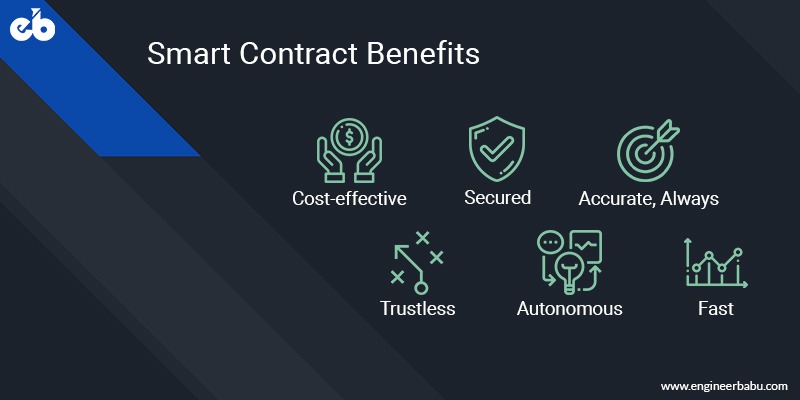
By applying smart contracts in our day to day life, we can make phenomenal changes as they offer multiple advantages over the traditional contracts. Smart contracts are more convenient and faster which make those acceptable for people to streamline their workflows.
They provide you with the right blend of security and ease of application as and when you need to exchange anything of value be it property, money or shared.
Eliminating the need for intermediaries make smart contracts even more attractive to apply in our lives. The usage of smart contracts is likely to gear up with the advancement of technology. Let us look at the benefits offered by smart contracts:
Transparency
One of the basic characteristics of blockchain technology which is also shared by smart contracts is transparency. As previously stated, smart contracts are filled with terms and conditions in absolute detail which are also checked by the parties involved in the agreement.
This eliminates the chance of dispute and issues at the later stages as the terms and conditions are thoroughly checked and put into place only when all the participants agree to those. This trait of smart contracts allows the involved parties to ensure transparency during transactions.
Moreover, need for precision in contract detailing keeps all the information open with everyone which ultimately resolves anything related to miscommunication issue. Therefore, with the aid of smart contracts, efficiency lost in communication gaps can be restored.
Time-efficient
In order to go ahead with any process involving documentation, it usually takes more than at least a couple of days. The delay in processes is due to a lot of intermediaries and unnecessary steps along the way. On the other hand, smart contracts are run through the aid of the internet as they are nothing but pieces of software code.
Therefore, the speed of completing transactions through smart codes is way too fast. Smart contracts can save hours or even days as compared to any traditional business process. Moreover, the time delay due to manual involvement is also eliminated.
Precision
A smart contract is coded in an explicitly detailed form. It requires to holds all the terms and conditions in it before it is finally put to work. Any condition that’s left out of the contract might result in an error while execution, therefore while creating smart contracts, all the conditions are put in the detailed form.
Due to this, the smart contract becomes a comprehensive agreement which when gets executed automatically, gets almost everything done. In the case of manual contracts, there are chances of errors as the person who is responsible for making a contract might miss one condition or the other. Moreover, there’s no way of even tracking it until the error is made. Therefore, smart contracts are a better alternative when it comes to achieving accuracy and precision.
Safety and Efficiency
Smart contracts with automated coding features are the safest options when it comes to data encrypted technology in the current times. Since they match the highest safety standards, the level of protection involved in them allows them to be secure to use for critical processes.
Moreover, since the smart contracts are so accurate and secure, their level of efficiency is way too high which generates more value in transactions.
Data Storage
Smart contracts are accurate and precise to the minutest level of the agreement. All the details of any transaction are stored on the contract and anyone among the involved parties can access it at any given time. Moreover, these transactions are stored on the blockchain in the form of future records. This is particularly helpful in terms of any dispute regarding the contract terms in the future.
Savings
Using smart contracts in place of traditional agreements can result in a lot of savings. First and foremost, as smart contracts only involve parties that are the part of the agreement; the need for middlemen is eliminated and the money involved in that is also saved.
All the lawyers, witnesses, and intermediaries have no role when smart contracts are used. Moreover, as stated earlier, smart contracts also save money as paper-based documents are not involved in any processes.
Trust
The properties of transparency and security make smart contract trustworthy in businesses. They obliterate any probability of manipulation as well as manual errors and establish confidence in their execution. Upon agreement on all the conditions, the contract automatically executes itself.
Another unique feature of these contracts may be their capability to significantly lessen the requirement of litigation and courts. Self-executing Smart Contracts allow parties to commit and bind by the conditions and rules written inside.
Paperless
As smart contracts are computer coded documents, the use of paper in the entire processes is eradicated. On one hand, this saves the cost while on the other, this is useful for companies globally as it helps them to save their bit of paper usage in terms of contracts and promotes their contribution towards the society.
Applications of Smart Contracts
Be it a new job or buying any new product, contractual agreements come into play as a proof for such things. However, the complex process of traditional paperwork and contracts involve high costs, third parties and chances of manual errors in such processes.
With digitization and technology moving ahead, we can make these processes more reliable and cost-effective with the help of smart contracts. The concept is to avoid any intermediaries and third-party systems and make the systems more effective and efficient. Smart contracts can be applied in different industries and sectors. Let’s have a look at some of them below:
Insurance
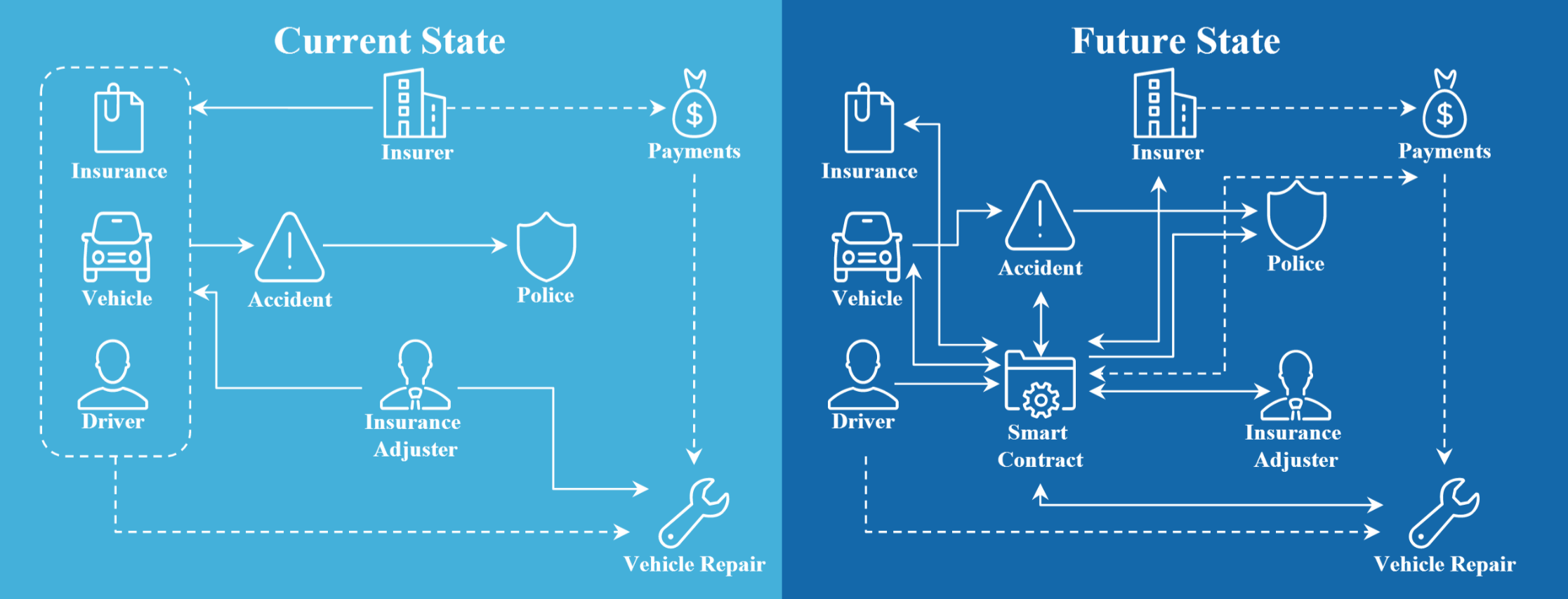 Image Source
Image Source
Lack of automation in insurance administration, claim processing can take a long time ranging from weeks to months. This becomes an issue for both the customers as well as the insurance companies as the customers are trapped in time constraints for their money. On the other hand, the companies have to face issues like unwanted administrative costs, dissatisfied customers, and inefficiency.
By using Smart contracts in such processes can result in simplifying and streamlining the processes by automatically triggering payment for a claim when certain conditions are met as per the client and company’s agreement. For example, in case of loss due to a natural disaster, smart contracts can be executed in a timely manner and people can claim their money and use them in time of need. Any specific details like the extent of loss due to damage can be kept on a blockchain and the amount of compensation can be decided accordingly.
Internet of Things
The IoT technology is being utilized to connect everyday devices to the internet in order to improve the interconnectivity of the systems in with the help of sensors. These devices can be connected to the blockchain system to keep a track of all the products and processes in the loop. For example, in a general scenario, you might receive a wrong order while shopping something online but with the combination of Blockchain and IoT, the product and its location can be tracked on every step of the way including the warehouse, transport, shipping to your doorstep. A fully-automated system will ensure that the right product gets delivered to the right person.
The sensors involved in the system create their own nodes on blockchain and with the help of smart contracts, the location and possession of the respective product can be traced. A smart contract keeps the location status updated all along the way till the product gets delivered. This helps in ensuring the correctness of the product from the initial shipment to delivery.
Mortgage Loans
Mortgage agreements are complex as many details are included in them such as income of the mortgagee, credit score as well as outgoings. In order to go ahead with mortgage loans, it is extremely necessary to carry out the checks on these details. This process often goes in the hands of intermediaries and third parties which makes it lengthy and troublesome for the lender as well as the loan applier.
Using smart contracts in this situation is beneficial due to multiple reasons. The most important being the elimination of the middlemen to avoid any lengthy process and confusion. Moreover, all the details can be stored in one location which is accessible by both parties at all times.
Employment Contracts
Employment contracts are another area where smart contracts are needed. If either of the party i.e. the employer or the employee fails to meet the set expectations, the terms of the agreement can be compromised. This leads to a lack of trust which is solved by smart contracts. By using a single smart contract for both the parties, the terms, and conditions can be made clear which would help improve fairness. These records could be anything such as salary amount, job responsibilities etc. Once these transactions are recorded on smart contracts, they can be looked into in case of any conflict. This will improve the employee-employer relationship.
Moreover, smart contracts can be utilized to make wage payment processing easier so that the desired employee receives the agreed amount in a specific time period. Also, in the case of temporary labor where the employer, employee and an agency is involved, smart contracts can be used to introduce transparency. This will prevent the agencies from interfering with the contract term of the employee once he/she is hired by the company. Any changes in terms can be detected with the aid of smart contracts.
Securing Copyrighted Content
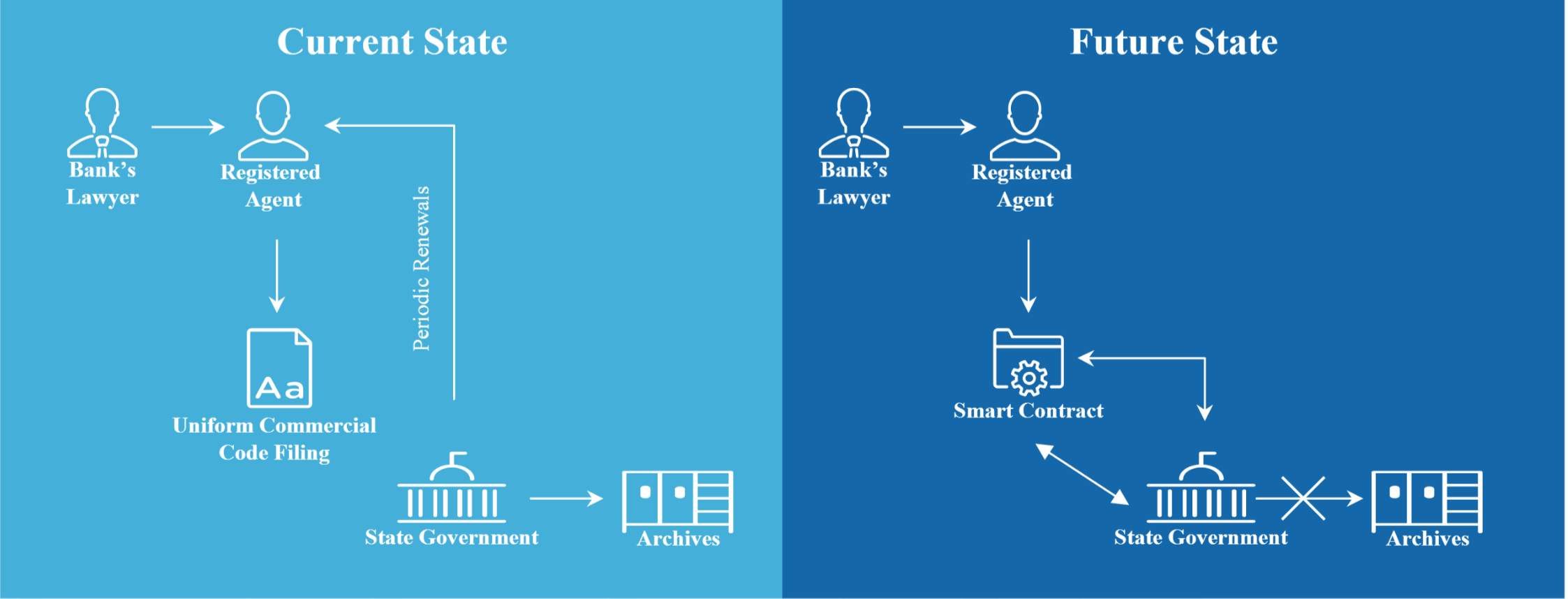 Image Source
Image Source
In the digital world of today, content is not limited to just words. It could be anything from a written document to a video to an audio clip. When a piece of content is released commercially, the owner of the content receives a royalty fee theoretically. However, the process of creation involves multiple parties and thus, all of them are liable for payments or royalty. In practical implication, this is not ensured as there is no defined way of clearing the confusion over entitlement. Smart contracts can resolve this by ensuring the royalties to the desired contributor by recording the ownership on a blockchain.
Supply Chain
Supply chain management involves the flow of goods and products from the initial stage to the final stage. Being a major part of many industries, proper functioning of a supply chain is crucial for businesses. Supply chain management is not a one person job to do and thus, there are different entities involved in it. Smart contracts in the supply chain can record ownership rights while the products are transferred through the supply chain. Everyone in the network can track the location of the product at any given time.
The final product can be checked at each stage throughout the delivery process until it reaches the end customer. If an item is lost in the process, smart contracts can be used to detect its location. Also, if any stakeholder fails to meet the contract terms, it would be transparent for the whole system to see. They bring transparency to the overall supply chain system.
Smart contracts have certain advantages for many industry sectors such as, reducing overhead costs, providing transparency, and saving time. While they are more reliable, secure, efficient and trustworthy as compared to paper contracts, care needs to be taken to avoid the risks of code corruption and as businesses move forward and accept digital processes, risk awareness is integral too.
Conclusion
The potential of smart contracts cannot be limited. They can be used for small regular agreements as well as contracts for governments and enterprises too. They allow traders and buyers to track their purchase back in the supply chain which increases trust.
While third-parties like lawyers, government bodies etc. make a hole in our pockets in the form of fees for making agreements; smart contracts save this money by eliminating the need for such intermediaries. When it comes to using them, all we need to do is check the code before the execution, everything after that will be done in an electronic way. Smart contracts provide us with an opportunity to make our routine transactions and processes more streamlined and automated.
The base of smart contracts are interfaces, business rules, and data. With evolving technology, smart contracts will also need to be updated for eliminating any compatibility issues with operating systems and perform their directed functions correctly. While these are still in their developing phase, they might face certain vulnerability attacks. In order to make smart contracts a part of our day to day life, both, cybersecurity practices as well as the platforms to create smart contracts need to be updated from time to time.

